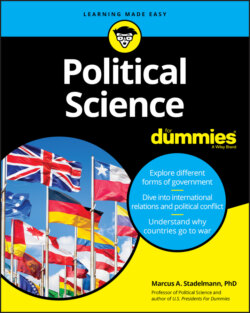Читать книгу Political Science For Dummies - Marcus A. Stadelmann - Страница 68
Needing three political cultures to sustain democracy
ОглавлениеInstead of picking one of three political cultures discussed in the previous section, Almond and Verba claim that a country needs a mix of all three cultures to sustain democracy. A pure parochial society wouldn’t exist very long. Keep in mind that parochials feel no love or loyalty to a national government, instead focusing purely on the local level. If a whole nation consisted of people who don’t like the nation or the government in charge, it would collapse.
At the same time, a nation full of subjects would result in the collapse of democracy, too. If every citizen was just a follower who would obediently abide by government rules, government could soon turn authoritarian. The Soviet Union and Nazi Germany, for example, consisted of pure subject cultures, with citizens blindly obeying government decisions.
Now what about a pure participant society? Could you imagine if every American citizen was a pure political animal? What would happen to the system if more than 150 million people were active in politics and demanded benefits from government? According to Almond and Verba, this would result in a system overload. Government couldn’t deal with that many demands, and people in turn would take action against government if they didn’t get what they asked for.
For this reason, Almond and Verba advocate for a mix of the three cultures. Every democracy has to have all three cultures to survive in the long run. A democracy needs people who just don’t care about politics, have no knowledge of what’s going on, and don’t participate (parochials). At the same time, government often has to make controversial decisions for the good of the country, such as increasing taxes to pay off government debt or fund new programs. In this scenario, a democracy needs subjects who will complain bitterly about these decisions but won’t take any action against government.
Finally, participants are needed to hold the government accountable. Whenever government makes a decision, it needs to know that its citizens will hold it accountable for these decisions. Almond and Verba refer to this as anticipated reaction. Government and its leaders make decisions based on how they believe people will react to their decisions. Often no reaction will come, but a rational leader believes that it will, and so policy is made, which is acceptable to most people.
In the last few decades, fewer and fewer people have been voting in democracies. This has concerned many, but the concept of anticipated reaction comes to the rescue. Anticipated reaction refers to political leaders assuming that the people will react to their policies and, if objecting, will organize into political parties or join interest groups and, most important, will participate in voting. Therefore, every rational politician will do his best to represent the people. It’s out of fear of people becoming upset and holding political elites accountable that politicians attempt to do their best to represent people. Recent examples of people organizing because they were upset with government decisions include the Tea Party movement as a reaction to Obamacare in the U.S. and the creation of new populist parties in Europe, such as the Alternative for Germany as a reaction to mass migration from the Middle East and Africa.
